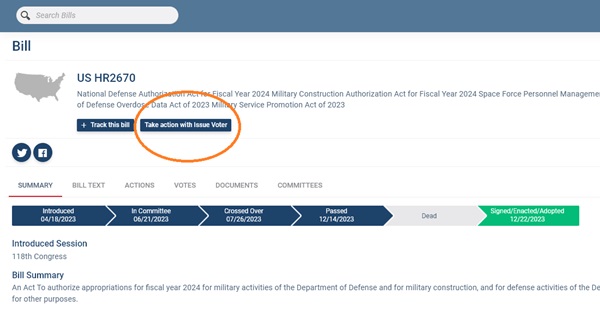Welcome to our first IssueVoter Bill of the Month for 2024! IssueVoter is a nonpartisan, nonprofit online platform dedicated to giving everyone a voice in our democracy. As part of their service, they summarize important bills passing through Congress and set out the opinions for and against the legislation, helping us to better understand the issues. BillTrack50 is delighted to partner with IssueVoter and we link to their analysis from relevant bills. Look for the IssueVoter link at the top of the page:

The National Defense Authorization Act
The 2024 National Defense Authorization Act was actually signed into law by the President on December 22, 2023. So it's not technically a January 2024 bill but given its importance as the only appropriations bill to be approved so far, and one of the only 34 bills that Congress managed to pass last year, I thought it's worth looking at it in a bit of detail. You can see the IssueVoter analysis of the bill and opinions for and against here.
The bill authorizes Department of Defense activities and programs for 2024 for military activities and construction, along with the military's fiscal setup. In total, that comes to an eye watering $886.3 billion. To put that in context, that's about the GDP of Turkey, a country with 86 million inhabitants (but, interestingly, not a single aircraft carrier). The NDAA authorizes $842 billion for the Department of Defense, $32 billion for the Department of Energy, with the rest for national security programs at other agencies.
Highlights of the funding include a 5.2% pay rise for servicemembers, the largest in more than 2 decades. It also boosts provisions to counter Chinese influence in the Pacific, such as funding for the AUKUS (Australia, United Kingdom, United States) security pact, allowing the transfer of Virginia-class submarines to Australia, training Australian private-sector defense personnel, and facilitating the sharing of technology and information between the three nations.
The NDDA also included $676 million in funding for the World Trade Center Health Program, to ensure that all responders to the September 11, 2001 attacks can receive top-tier medical care. Many are still falling ill from diseases like sarcoidosis, a lung condition impacting many responders who breathed toxic smoke and dust during the response.
Its Path to Becoming Law
The bill faced a rocky passage, as have all the appropriations bills currently making their way through Congress. More conservative House Republicans had a very specific wish list. "The NDAA is going to need to have some serious amendments if you're going to want to get that thing moving. I'm just not all that confident currently that we're addressing the kinds of things that we need to address.", said Rep. Chip Roy.
Republicans attempted to include provisions to remove the DOD abortion travel policy, which allows servicemembers who travel across state lines for an abortion to be reimbursed for travel expenses and to restrict funding for gender-affirming case for transgender service members. Neither of these provisions made it into the final bill, though Republicans did manage to freeze hiring for diversity and inclusion training in the military until a full accounting of the program is made to Congress. Some representatives were also upset the bill authorized a four-month extension of Section 702 of the Foreign Intelligence Surveillance Act (FISA), which allows the U.S. government to collect foreigners’ communications data, and sometimes sweeps up Americans’ data in the process.
As a result of the controversy, the bill only passed with the support of House Democrats. In fact, more Democrats than Republicans voted to pass it as you can see in this breakdown:

It garnered broad bipartisan support in the Senate, with 87% of senators voting in favor:

The race is now on to pass the remaining 11 appropriations bills, or put in place yet another continuing resolution, to avert government shutdowns as the January 19 and February 2 deadlines approach.
--------------------------------------------------------------------------------------------------------------------------------------------------------------------------------------------
About BillTrack50 – BillTrack50 offers free tools for citizens to easily research legislators and bills across all 50 states and Congress. BillTrack50 also offers professional tools to help organizations with ongoing legislative and regulatory tracking, as well as easy ways to share information both internally and with the public.
About IssueVoter - IssueVoter is a nonpartisan, nonprofit online platform dedicated to giving everyone a voice in our democracy. Their free public service makes civic engagement accessible, efficient, and impactful by providing alerts on new legislation, helping you understand new bills quickly and share your opinion directly with your representative.
Photo by Michael Afonso on Unsplash
Thanks to Fed Manager for this excellent article which provided source material.